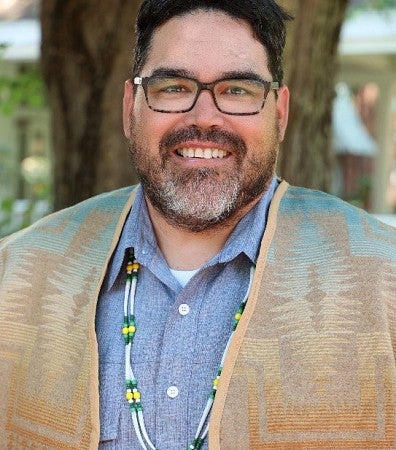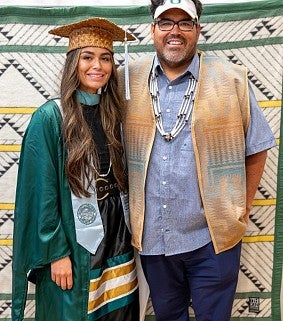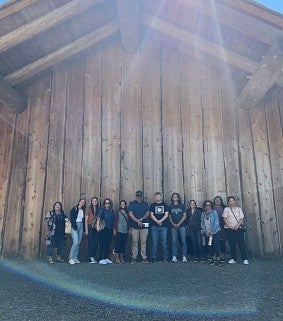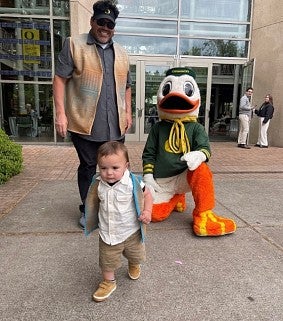
Learn more about Kevin Simmons, a doctoral student graduating from the Sapsik'ʷałá Teacher Education Program, Special Education, through our Graduate Spotlight series
Kevin Simmons (Grand Ronde/Muckleshoot)(he/him), is from Grand Ronde, Oregon. An enrolled member of the Confederated Tribes of Grand Ronde and a descendant of the Muckleshoot tribe of Washington, Kevin currently serves in the fields of child welfare, teacher preparation, AIAN youth mental health and trauma, and opioid prevention. He is an advocate for programs, services, and communities that strengthen tribal families through culturally based services and interventions. Kevin is a PhD candidate at the University of Oregon with research interests in culturally based pedagogy, adaptations of evidence-based practices, and the utilization of culture and culturally responsive practices to impact western based outcomes for American Indian/Alaskan Native youth, people, families, and communities.
Kevin’s current work includes student success, engagement, and outcomes with American Indian and Alaska Native populations. He has worked with the American Indian Higher Education Consortium (AIHEC), Northwest Portland Area Indian Health Board (NPAIHB), the National American Indian and Alaska Native Mental Health Technology Transfer Center (MHTTC), National Mental Health Technology Transfer Center Network Coordinating Office, Oregon Department of Human Services (ODHS), Drug Enforcement Administration (DEA), and numerous tribal communities and governments across the country. He has presented his research and work in a number of fields and settings: child welfare, public health, education, international Indigenous forums, and various tribal governments and entities. Kevin’s work includes development of systems, practices, curriculums, and professional development opportunities that center the lived experiences and knowledge of Native people and life ways: Culture as Intervention™ and the Native American Family Engagement Model (NAFAM)™ provide service delivery systems with culturally informed and Indigenous based practices to serve tribal people, families, and communities.
Can you tell us about your work serving in the fields of child welfare, teacher preparation, AIAN youth mental health and trauma, and opioid prevention?

Child Welfare: My dissertation, A Pilot Study of a Culturally Adapted Motivational Interviewing Training for Tribal Child Welfare Personnel, is a Community-based Participatory Research Project (CBPR) with the child welfare programs of the nine federally recognized tribes in Oregon, Oregon Department of Human Services, and the Native Center for Behavioral Health at the University of Iowa. In the efforts to reduce the number of American Indian and Alaska Native children and families in the child welfare system by supporting front line personnel in building better relationships with the families they serve. The project culturally adapted a Motivational Interviewing training curriculum for front line tribal child welfare personnel. The project’s innovation is a culturally based instructional method, the Indigenous Instructional Praxis (IIP). Rather than adapt an evidence based practice, the project adapts the way in which Motivational Interviewing is taught in tribal communities.
In addition to my child welfare work in Oregon, I was recently offered the Child Welfare Director position with the National Indian Child Welfare Association and will begin my tenure after graduation in June 2025.

Teacher Preparation: For the past few years I have been able to serve as a Graduate Employee (GE) for the Sapsik’ʷałá Teacher Education Program in the College of Education. This opportunity has been full circle as I first began my journey at Oregon as a Sapsik’ʷałá student pursuing a Masters degree in SPED (12’). I have witnessed program faculty and staff from Sapsik’ʷałá, UO Teach, COE, as well as the wider-UO campus community work to support the mission of preparing and training American Indian and Alaska Native people to become teachers. There are approximately 120 plus Sapsik’ʷałá graduates serving in tribal schools, communities, and students across the country. I think about the impact that one teacher has in AI/AN communities and amazed at the work and mission of Sapsik’ʷałá. I have been able to work on recruitment, retention, and programmatic components of the program. Yet, the most impactful part for me is being a part of this wonderful community.
American Indian and Alaska Native Youth Mental Health and Trauma: I developed and facilitated a virtual learning collaborative for tribal governments, programs, and organizations across the country. Tribal AWARE Gatherings were designed to assist tribal service delivery systems develop school and community based mental health programs that weave western and tribally based programs together to improve American Indian and Alaska Native youth mental health outcomes. The program was supported and sponsored by the National Coordinating Office (NCO) for the Mental Health Technology Transfer Center (MHTTC). MHTTC was a SAMHSA sponsored grant coordinated at Stanford University serving the mental health needs in the US through the 10 DHHS regions. Tribal AWARE Gatherings were attended monthly by 20-25 plus tribal governments, communities, and organizations.
Trauma specific: Through my association with the Native Center for Behavioral Health at the University of Iowa, I developed a nationally scoped technical assistance and awareness program titled Native Approaches to Special Education (NASPED). NASPED’s primary aim is to assist teachers, administrators, providers, and other professionals serving American Indian and Alaska Native youth and families with disabilities achieve better outcomes by building better relationships through trauma informed and culturally based services.

Opioid Prevention: I consulted with the Drug Enforcement Administration (DEA) through a 3rd party to assist tribal communities across the country develop opioid prevention initiatives and programs. I assisted with engaging tribal leaders, community members, and educators developing specific educational initiatives with the primary goal of preventing tribal youth from opioid use and abuse. As an educator, I was able to provide specific technical assistance about activities and ways of teaching that serve the best interests of tribal people. To date, the team I was associated with has been able to work with tribal communities in Washington state and Wisconsin.
How has being an advocate for programs, services, and communities that strengthen tribal families through culturally based services and interventions helped inform your research?
Being an advocate for programs, services, and communities that strengthen tribal families has informed my research in several ways, however, the two primary influences include: 1. Working to weave western-based research methods and programs with traditional American Indian and Alaska Native (AI/AN) knowledge and experiences, and 2. Understanding the policies and funding needs within Indian Country that impact programs and organizations that serve AI/AN families.
Tribal communities maintain all the solutions to address issues in their own communities, however, I whole heartedly believe that incorporating tribal knowledge and experiences with western-based research programs is a best practice model.
For example, my dissertation is a culturally adapted training model for the evidence-based practice of Motivational Interviewing (MI). I was able to develop a specific teaching method based on Indigenous educational principles. I used Indigenous knowledge and experiences to adapt the way in which an evidence-based practice was taught. This has significant implications for learning, implementation, and fidelity in tribal communities. All of this came together because I wanted to find ways to have an impact on the number of American Indian and Alaska Native youth and families engage with the child welfare system. And I believed that education and the way in which Indigenous people teach could assist in these efforts.

How has the COE's Special Education program prepared you for your career?
The SPED program has been fundamental in my career. I am reminded of the people and individuals whose influence has shaped my journey. My advisor Dr. Chris Murray always picked up his phone, and he provided continuous counsel about the educational and PhD journey. He has shared so much with me, but he has always counseled me to make sure that the research I pursue has an impact on the world at a personal level. Dr. Beth Harn provided a perspective early in my PhD journey about change and impact in the world. I credit Beth for inspiring me to seek change at the front line level, which is why I chose to focus my dissertation on front line tribal child welfare personnel. I was inspired by COE Dean Laura Lee McIntyre when she showed up to a small event welcoming a new faculty member in the COE. Sometimes showing up is the most impactful thing we can do as a leader. I credit Dr. Geovanna Rodriguez for inspiring and motivating me to explore youth and school based mental health. I enrolled in a School Based Mental Health course with Dr. Rodriguez and this led me down the path to serving tribal schools and communities through the school mental health pathway.
What are your plans following graduation?
As stated earlier, I will continue my journey as the Child Welfare Director for the National Indian Child Welfare Association (NICWA). My research journey will continue through my involvement with developing improved ways to train and teach professionals in tribal communities. Specifically, the culturally informed Motivational Interviewing curriculum developed through my dissertation continues to be one of most requested trainings across Indian Country and planning for the next phase of implementation of MI in tribal communities is actively underway.
What made your experience at UO special?
My GE experience with the Sapsik’ʷałá Teacher Education Program is always a highlight. Not only did I get the opportunity to serve future educators, but the community associated with Sapsik’ʷałá provided a space and place for me to feel at home. I am appreciative of Dr. Leilani Sabzalian, Dr. Michelle Jacob, and the entire Sapsik’ʷałá community.
Sapsik'ʷałá, a Ichishkíin/Sahaptin word meaning "teacher", is the name of a program created by the University of Oregon College of Education in partnership with the nine federally recognized Tribes of the State of Oregon. The 12-month program allows participants to earn a master of education (MEd) degree and teacher licensure. The Sapsik'ʷałá Teacher Education Program supports American Indian and Alaska Native teacher candidates in becoming professional educators, provides funding for teacher candidates' cost of attendance, and provides two years of support services once in the field.
